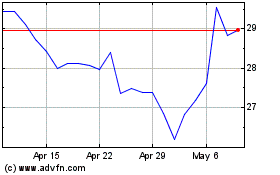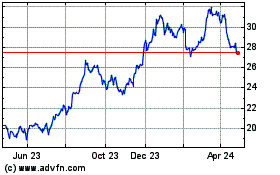China's banking regulator is signaling a clampdown on one of the
fastest-growing and riskier parts of the financial system:
investment vehicles called wealth-management products used by banks
to get around regulatory limits on lending.
The China Banking Regulatory Commission has distributed a draft
of rules being considered that would limit who can buy such
investment products, according to bankers and a draft of the rules
viewed by The Wall Street Journal. The rules would also limit the
products' investments in riskier assets such as stocks, and
restrict sales of them by smaller banks.
The proposed rules are being circulated to banks at a time of
growing concern about China's so called shadow-banking sector, a
lightly regulated area of the financial system that is responsible
for a rapid buildup of largely off-balance-sheet debt at banks and
other institutions.
Assets funded by wealth-management products grew by seven times
in the past four years to around $3.2 trillion, making them the
largest single portion of China's shadow-finance sector, according
to Moody's Investors Service.
Chinese authorities have implemented other measures in recent
years to rein in the growth of the investment vehicles, which
collect customers' deposits and invest them in everything from
loans and bonds to stocks and commodities.
Several bankers said privately that the proposed regulations
would mark the most comprehensive attempt yet to curb proliferation
of the products. The regulator began circulating a 21-page copy of
the proposed rules to the nation's banks on Tuesday, according to
bankers who received the document.
The rules are designed "for strengthening the supervision of
commercial banks' wealth-management business, promoting the healthy
development of commercial banks' wealth-management business, and
protecting the rights and interest of financial consumers," the
document said.
The regulatory commission confirmed the document's authenticity
and said it was circulated as part of an effort to seek feedback
before final rules are introduced. Some of the rules were plucked
from a 2014 draft that was never implemented.
In a sign that investors are taking the newest draft seriously,
Chinese stocks fell sharply Wednesday on concern that new
regulations would crimp flows of money from these investment
products into the stock markets.
On Thursday, some bankers had already met with the regulator to
discuss them, one bank executive said. The document is being
interpreted as a warning shot to control excesses of the industry,
bankers said.
Wealth-management products have gained prominence in recent
years as a means for small and midsize banks to continue to issue
loans even when these banks lacked enough capital to take on
additional lending under regulatory standards, according to Jason
Bedford, who studies China's banking system at UBS in Hong
Kong.
More recently, banks and other institutions have been pumping
investments from wealth-management products into riskier assets
such as stocks and commodities to notch the higher returns promised
to customers.
China observers have cautioned that the growth of
off-balance-sheet finance is adding complexity and risk to the
economy, mainly because the loans and investments in the
wealth-management products don't have the same levels of
provisioning as banks on-balance-sheet lending.
The growth of the sector has put regulators in a tricky
situation. On the one hand, the credit generated by the products
has helped some struggling companies get by. On the other hand, the
growth of essentially off-balance sheet lending masks the extent of
problematic loans in China's banking system.
"A part of what is going on right now in China is that the
banks, particularly the smaller banks, have expanded their balance
sheets very rapidly, and the regulators are worried about this,"
said Arthur Kroeber, a partner at the China-focused Gavekal
Dragonomics research firm.
The document appears to target the risks related to
wealth-management products that invest in stocks and other riskier
assets, more than ones that concentrate on more-traditional assets
such as loans to companies.
For example, the document says that wealth-management products
that dabble in riskier investments such as stocks should be sold
only to more-sophisticated investors. Retail investors should be
limited to buying wealth-management products that invest in
more-stable assets such as bonds.
Another rule suggests that retail investors shouldn't be allowed
to invest in wealth-management products that hold bonds or loans
that are distressed.
The new rules also seek to reduce broader systemic risks. For
example, they would require banks to set aside more reserves as
provisions against potential losses by the wealth-management
products. They also place limits on wealth-management products
investing in other loans issued by the banks.
The regulatory commission didn't give a timeline for the
implementation of the new rules.
In the past, China has walked back from proposed regulations on
its financial system if the new rules appear to threaten growth,
some analysts said.
"They are aware of the risks, but they are also very focused on
their growth targets," said Stephen Schwartz, who follows China's
shadow-financing markets at Moody's Investors Service in Hong
Kong.
Wei Gu and Grace Zhu contributed to this article.
Write to Chao Deng at Chao.Deng@wsj.com and John Lyons at
john.lyons@wsj.com
(END) Dow Jones Newswires
July 28, 2016 14:05 ET (18:05 GMT)
Copyright (c) 2016 Dow Jones & Company, Inc.
UBS (NYSE:UBS)
Historical Stock Chart
From Mar 2024 to Apr 2024

UBS (NYSE:UBS)
Historical Stock Chart
From Apr 2023 to Apr 2024
